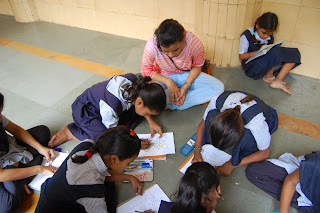"After my 13 years of education I still don't know how mortgage or taxes work but at least I know about the cells inside a leaf" - this is the story of every 18 year old in the country. The Indian education system focuses more on theoretical knowledge than any kind of practical education that will actually help most of our population to get jobs in the future. Providing hard skills or understanding of practical know how will empower a very large section of students coming from a lesser-privileged background. The point is not to do away with what is already being taught in our classrooms, the point is how to incorporate life skills and lessons within the already set and existing structure. It is important to nurture the young minds of India with both education and the ability to be employed.
 |
| Government and Education |
In order to tackle the loopholes in the education system, the following things can be undertaken. The first points of contact for any education society are the teachers. The government has a tremendous challenge of expanding the school system and at the same time putting resources in training teachers. Across India around 25 per cent of teachers remain absent everyday. Improving the method by which the teachers teach can be a solution to education reform in India. It is important to motivate and support the teachers so that they become quality-conscious and feel responsible for the improving the system. One way of doing so is by identifying and implementing no or low cost teacher led practices that have the potential to make a significant positive impact on student learning. The best part about is that there is almost no cost involved in this method as it is something that is already existing within the system.
 |
| Children learning while playing |
Another thing that can be done in order to reconstruct the education system, is adding innovative life skills sessions within framework of the classroom. It is important to provide students with a set of skills that are going to help them deal with situations that may arise in the future. This will help them battle such times aptly. Students from underprivileged backgrounds, who may drop out of schools at later stage can use this very knowledge to their advantage in some way or the other. This set of skills can range from how to tackle your debts to even carpentry. The list can be vast.
 One of the most important and grass root method that can be adopted to improve this system is letting the citizens of the locality taking charge of the schooling system near them. This is what we do at CACR.
One of the most important and grass root method that can be adopted to improve this system is letting the citizens of the locality taking charge of the schooling system near them. This is what we do at CACR.Citizens Association for Child Rights-CACR , is a network of like minded citizens concerned about ensuring child rights with specific focus on ensuring good quality of education and health for all children. The network comprises of citizens who visit neighbourhood municipal schools and clinics, and participate in various programmes like School Management Committees, Computer Literacy Programme and Virtual Classroom projects, etc. and oversee the overall functioning and quality of education in municipal schools. We at CACR believe that regular interaction and discussions with the hierarchy of the Education Department and sharing of observations and suggestions with them periodically will ensure improved accountability and proper distribution of facilities and amenities for children enrolled in these schools. Citizens Association for Child Rights very strongly believes in supplementing the system and does not believe in creating parallel systems. We believe that the urban privileged public has immense power to influence and impact the lives of affected children for the better through government interface and participation.
 |
| CACR volunteers helping students get creative |
All the above will help us change the face of the education system in India.
Irrespective of all the cons in the system I believe that education is something that takes time to build-up but we should be hopeful on that count.
-by +Meesha Gandhi is a intern with CACR , a nonprofit startup working to improve the education and health in public schools of Mumabi,India . Edited by +Richa Singh









